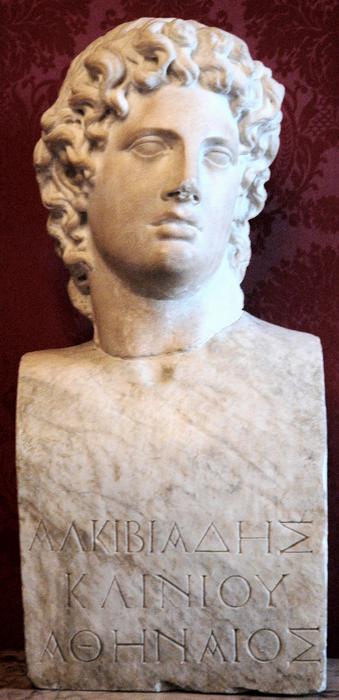1. Artemisia of Caria destroys one of her own ships
Artemisia, portrayed a tad bit incorrectly by Eva Green in the recent 300 film,
was a queen and military commander from the Ionian Kingdom of Caria. An ally to the massive Persian Empire of the early 5th century, Artemisia was a trusted advisor to King Xerxes and was instrumental during the second Persian invasion of Greece.
And yes, in a time when women were often confined to the home or considered an extension of their husbands, Artemisia is significant in that she not only gained a position of power within the Persian army, but that she was also highly successful once established.
Herodotus tells us that of all of Xerxes advisors, he trusted and admired Artemisia more than any man. The Father of History also tells us that it was Artemisia who advised Xerxes not to attack the Greeks at Salamis, a military engagement that would end in disaster for the unlucky Persian navy. However, rather obviously, Xerxes launched the attack regardless and sent Artemisia, once again, into the fray to duke it out with Themistocles and the other Athenian warriors.
Despite Artemisia’s many previous successes, things did not go very well at Salamis. Herodotus tells us that once the battle was underway the Persian ships quickly fell into disarray. Artemisia’s own ship was swiftly pursued by an Athenian vessel. It is said that, in her haste to escape from her pursuer, Artemisia bored straight through the hull of an ally ship.
Oops…
It is probably lucky for Artemisia that upon ramming the ship, the entire crew drowned. That means that there was nobody left to bring charges against her.
So I guess you could say everything worked out okay, or…whatever.
2. Themistocles is ostracized
While Artemisia was busy ramming her own ships, on the other side of that battle was Themistocles, the famed Athenian general who is often considered to be chiefly responsible for the Greek victories during the Persian invasion.

A brilliant strategist, an affluent speaker, and, most importantly, a wily politician, Themistocles came to prominence during the early years of the Athenian democracy. By appealing to the common citizens of Athens, he earned their respect and would become the most dominant political player in Athens.
Yes, it seemed like Themistocles could do no wrong. He convinced the Athenians to build up their navy, successfully ostracized his political opponent, Aristides, and then managed to send the seemingly indomitable Persian army back across the Aegean. What could possibly go wrong?
Well, it would seem that after the end of the Greco-Persian war, Themistocles got a little too big for his britches. That’s an American expression, it basically means that he turned into an arrogant jerk.
Yes, the savior of Greece became synonymous with extravagance and hubris. Plutarch tells us that Themistocles built a temple dedicated to the goddess Artemis in his home of Melité. Within the temple, Themistocles erected a statue of himself with the intention of glorifying his accomplishments.
After some time of this behavior, it would seem that the people of Athens had had enough of Themistocles. He was ostracized from Athens in 471 BC. The great general had been shunned from the very city which he had saved from the Persians several years before.
It is possible that Themistocles’ political enemies were simply jealous of his accomplishments. Plutarch seems to think so. He writes in The Life Of Themistocles…
“Ostracism was not a penalty, but a way of pacifying and alleviating that jealousy which delights to humble the eminent, breathing out its malice into this disfranchisement.” -Plutarch (Life of Themistocles)
Ironically, Themistocles would make his way to Persia. He would plead with King Admetus of Molossia to allow him to assimilate into Persian society. For whatever reason, life in Persia was not kind to Themistocles. Seeking shelter with his former enemy, banished from his homeland, Themistocles would die shortly after his arrival in this strange land; presumably from natural causes.
3. Miltiades is imprisoned
Transitioning form the man who is considered to be the hero of Salamis, we look now towards the man who is largely considered the architect of the Athenian

victory at Marathon. That’s right dear readers, while Miltiades is remembered as the man who stayed off an initial Persian invasion in 490 BCE, it turns out that that was the highlight of his career.
Bolstered by his military victory against King Darius, Miltiades swiftly became one of the most popular men in Athens. He used this popularity to convince the government of Athens that he required seventy triremes as well as men and funds to support a military campaign; the specifics of which were known only to Miltiades.
That’s correct, Miltiades asked for money, men, and ships but didn’t bother telling Athens what they were to be used for. In fact, the only thing he did tell them was that, if given these supplies, he would enrich the city with an untold amount of money and wealth.
Carried away by the excitement yielded by such promises, the Athenians gladly supplied Miltiades with everything he had asked for, never once considering that the hero of Marathon would attempt to defraud them.
And so, Miltiades set sail for the small island of Paros, located in the central Aegean. Officially, it had been concluded that Paros had been a Persian sympathizer and had provided supplies to the invaders during the battle of Marathon. As retribution for this, Miltiades had decided to invade Paros and lay claim to its treasures. While this may all seem sensible enough, Herodotus tells us that Miltiades had an ulterior motive, one that was much more personal.
“For the truth of the matter was that he was angry with the Parians because Lysagoras the son of Teisias, a Parian by birth, had slandered him to Hydarnes the Persian.”
As unbelievable as it may sound, Herodotus would have us believe that the great general of Marathon set siege to a tiny Greek island as recompense for their trash talk the previous year.
Unfortunately for Miltiades, his personal vendetta would not be very successful. The Parians hid behind their city fortifications and successfully stayed off the invaders for several days. The Athenian general himself suffered a severe injury when he cut open his thigh while attempting to jump a fence that surrounded a shrine on the outskirts of the city. Injured and out of options, Miltiades returned to Athens with no money and with none of the promised loot.
“Miltiades on his return to Athens became the talk of the [136] town; many were loud in their censure of him, and especially Xanthippus, the son of Ariphron, who brought him before the people to be tried for his life on the charge of defrauding the public.” -Herodotus (The Histories)
Needless to say, the Athenians were spitting mad when they realized that Miltiades had returned with no wealth and that he had originally set out on the campaign for his own vindictive reasons. The general was imprisoned and a trial was set to determine the fate of the man who had defrauded the Athenian government.
The trial would be of little significance. It was at this time that Miltiades’ wound grew gangrenous. The hero of Marathon would recline on a couch, sick and injured, while his friends argued in his defense during the trial.
Miltiades was not sentenced to death, but he would succumb from infection all the same. The man who was once considered the savior of Greece would die in a prison cell. His children would be forced to pay the fine that the government had levied against Miltiades for his crimes.
4. Alcibiades Sleeps With The Spartan Queen
How could we not include Alcibiades in a list of ancient political scandals? After all, this is the man who managed to gain the reputation of being the most incorrigible rogue of ancient Athenian society. Remembered as a brilliant military strategist, as well as the most unrelenting pervert of the 5th century, it is perhaps unsurprising that Alcibiades would be the center of a scandal concerning the Spartan Queen and the question of her pregnancy.

Thucydides tells us that upon the eve of what would be known as the Sicilian Expedition, disaster struck for the Athenian military when Alcibiades was accused of desecrating a temple dedicated to the god Hermes. And while Alcibiades requested an immediate trial, his request was denied. He was sent on a military campaign with the prospect of a trial for his life waiting for him back in Athens.
And so, perhaps with this idea in mind, Alcibiades defected to the Athenian’s bitter rivals, the Spartans. It was there that he promised his one time enemy that he would…
“…render them aid and service greater than all the harm he had previously done them as an enemy.” -Plutarch (Alcibiades)
Perhaps by appealing to one of his greatest talents, that of public oration, Alcibiades convinced the Spartans to offer him asylum. He would prove to be a useful military advisor for the Spartans and would assist in many victories credited to the Spartans in the latter half of the Peloponnesian War.
However, his stay in Sparta was short lived. Thucydides reports that after some time, the Spartans began to distrust Alcibiades. King Agis of Sparta would command one of his own admirals to put Alcibiades to death. Fortunately for the exiled Athenian, he would become aware of this plot against his life and would flee Sparta and find refuge in the Persian Empire.
Why the sudden mistrust of Alcibiades? We may never know for sure. However, Plutarch tells us that it was because a rather unsettling rumor had been circulating around the Spartan city. It was one involving Alcibiades and the Spartan Queen, Timaia.
Alcibiades was accused of having slept with the queen and of fathering her child, Leotychides. It was fortunate for the Athenian that these rumors were made aware to him. It allowed him to escape and find refuge in the Persian Empire before the Spartan King, could end his life.

 victory at Marathon. That’s right dear readers, while Miltiades is remembered as the man who stayed off an initial Persian invasion in 490 BCE, it turns out that that was the highlight of his career.
victory at Marathon. That’s right dear readers, while Miltiades is remembered as the man who stayed off an initial Persian invasion in 490 BCE, it turns out that that was the highlight of his career.










2 comments
Magnificent. It’s also so great to be Greek and be able to read the words and get to know more from those you learned in school. Thank you!
whoever wrote this article doesn’t have a clue about history.. where exactly his source (Herodotus) makes all those statements he’s referring to? even if i missed them hasn’t he even heard about Plutarch’s book ”Περί κακοηθείας Ηροδότου” (About Herodotu’s malignancy) ??? he has bad manners also! WHO DOES HE THINK HE IS TO CALL THEMISTOCLES AN ARROGANT JERK and ”synonymous with extravagance and hubris”??? maybe he would use a better language if Themistokles fought defending his own country.. Also Alcibiades was NOT accused of desecrating a temple dedicated to the god Hermes.. he was falsely accused of stealing the Hermes heads that were decorating the streets of Athens,,.. all those accusations against Themisocles, Alcibiades, Socrates, Plato and many more superb personalities were done from the democrats of that time.. because NONE of the fabulous generals, philosophers and scientists believed in democracy.. the democracy that killed Socrates, only to regret it later.. those personalities were aristocrates (aristos=’αριστος=the best, kratos=κρατώ=hold the power)…
Our apologies, you must be logged in to post a comment.